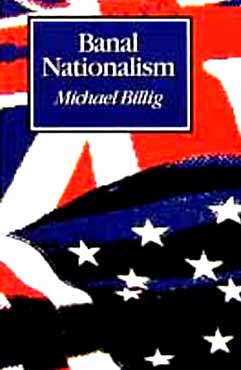BANAL NATIONALISM
January 7th, 2009 adminI’m currently reading an interesting book by Michael Billing called Banal Nationalism (Sage Publications, 1995). The thesis of banal nationalism suggests that nationhood is near the surface of contemporary life and makes a claim that nationalism is all too easily bracketed off as something extreme and irrational. Banal nationalism refers to the everyday representations of the nation which build an imagined sense of national solidarity and belonging amongst humans.
Billig suggests that nationalism is more than just a set of ideas expressed of separatists. Instead, nationalism is omnipresent – often unexpressed, but always ready to be mobilized in the wake of catalytic events. He writes: “A nation is more than an imagined community of people, for a place – -a homeland – also has to be imagined….The imagining of a ‘country’ involves the imagining of a bounded totality beyond immediate experience of place. The imaginery of the national place is similar to the imagining of the national community. As Benedict Anderson stressed, the community has to be imagined because it is conceived to stretch beyond immediate experience; it embraces far more people than those with which citizens are personally acquainted. The citizens of the nation state might themselves have only visited a small part of the national territory. They can even be tourists in parts of ‘their’ own land; yet it is still ‘their land’. The unity of the national territory has to be imagined rather than directly apprehended.â€

He cites examples of banal nationalism as the use of flags in everyday contexts, sporting events, national songs, symbols on money, popular expressions and turns of phrase, patriotic clubs, the use of implied togetherness in the national press, for example, the use of terms such as the prime minister, ur team, and divisions into “domestic” and “international” news, and even the weather. Many of these symbols are most effective because of their constant repetition, and almost subliminal nature.
Billig argues that the academic and journalistic focus on extreme nationalists, separatist movements, and xenophobes in the 1980s and 90s obscured the modern strength of nationalism, by implying that it was a fringe ideology. He notes the almost unspoken assumption of the utmost importance of the nation in political discourse of the time, for example in the calls to protect Kuwait during the 1991 Gulf War, or the Falkland Islands in 1982. He argues that the “hidden” nature of modern nationalism makes it a very powerful ideology, partially because it remains largely unexamined and unchallenged, yet remains the basis for powerful political movements, and most political violence in the world today. However, in earlier times calls to the “nation” were not as important, when religion, loyalty, or family might have been invoked more successfully to mobilize action.
To find out more about various academic studies on the topic of nationalism, visit the The Nationalism Project website here.

